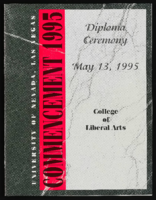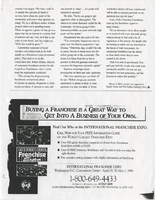Search the Special Collections and Archives Portal
Search Results
River Mountains Trail Partnership Records
Identifier
Abstract
The River Mountains Trail Partnership Records date from 1995 to 2015 and document the planning and construction of the River Mountains Loop Trail in Clark County, Nevada. The collection contains meeting agendas and minutes, correspondence, project notes, trail maps, land surveys, grant applications, photographic slides of the trail and Lake Mead, environmental assessments, ephemera from National Trails Day, trail guides, interpretive plans, and development reports.
Archival Collection
Karl Carsony Papers
Identifier
Abstract
The Karl Carsony Papers (1918-2011) are comprised of photographs, newspaper clippings, ephemera, and artifacts representing Karl (Schrom) Carsony's acrobatic career and personal life. The bulk of the materials in this collection date from approximately the early 1950s through the late 1970s. The materials also include vacation photographs of Karl (Schrom) Carsony and his wife, Margot Meyers. The materials also include promotional photographs, posters, and fliers for the Carsony Brothers, which was an acrobatic show consisting of Karl Carsony and his twin brothers, Joe and Bert Schrom.
Archival Collection
Jon E. Cobain Papers
Identifier
Abstract
The Jon E. Cobain Papers (1963-2009) contains material representing Cobain's experience as the first official graduate of Nevada Southern University (later University of Nevada, Las Vegas) in 1964. Materials include photographs of Cobain and his family, a scrapbook from his 1964 graduation day, newsletters, a copy of Beau's Bits Handbook, personal correspondence, and his diploma. This collection is comprised exclusively of digital surrogates.
Archival Collection
Aaron Williams Photograph Collection
Identifier
Abstract
The Aaron Williams Photograph Collection (approximately 1968 to 1983) consists of three black-and-white photographic prints. Two of the images are of the groundbreaking ceremony of the Senior Citizens’ Center with Las Vegas, Nevada Mayor Oran Gragson, and the third of three unidentified individuals.
Archival Collection

Alpha Kappa Alpha Sorority, Theta Theta Omega Chapter meeting minutes (redacted)
Date
Archival Collection
Description
From the Alpha Kappa Alpha Sorority, Incorporated, Theta Theta Omega Chapter Records (MS-01014) -- Chapter records file.
Text

Transcript of interview with Sari and Paul Aizley by Claytee D. White, November 4, 2016
Date
Archival Collection
Description
As Sari and Paul Aizley recall their separate childhoods and journeys to Las Vegas, their work and volunteer histories, their efforts to build a better society, and their life together they speak to each other as much as they respond to questions about their observations on the growth of the Las Vegas urban environment and their contributions to Southern Nevada's cultural development and a just society. In this interview, Sari and Paul speak to the cross-town commute and the physical UNLV campus in the late 1960s; the growth of the UNLV Math Department; the evolution of UNLV's Continuing Education; the State's North-South funding rivalry as reflected in the built environments of University of Nevada in Las Vegas and in Reno; plans to build a paleontology research facility at Tule Springs National Monument; the Review-Journal's "Ask Jessie Emmet" Real Estate column; local ACLU offices and politics; Fair Housing; transgendered persons; the Nevada State Assembly, and Class! magazine for Clark County high school students. Sari and Paul smile at each other as they recall how the editor/publisher met the bearded math professor and fell in love—despite the fact that they tell slightly different versions of their initial meeting(s). Sari passed away November 1, 2017, three days shy of one year after she participated in this interview.
Text

Nick Robone oral history interview: transcript
Date
Archival Collection
Description
Oral history interview with Nick Robone conducted by Claytee D. White and Barbara Tabach on December 21, 2017 for the Remembering 1 October Oral History Project. In this interview, Nick Robone, born and raised in Nevada, details his process of healing after being shot during the 2017 Las Vegas mass shooting at the Route 91 Harvest music festival. He discusses the events of that Sunday night and how he has learned to view life in a more positive light. Robone mentions various coping mechanisms that have helped him, including being open about his experience and talking about it with other survivors as well as pursuing his passions.
Text

University of Nevada, Las Vegas (UNLV) College of Liberal Arts Diploma Ceremony program
Date
Archival Collection
Description
Commencement program from University of Nevada, Las Vegas Commencement Programs and Graduation Lists (UA-00115).
Text
Julian Escutia-Rodriguez (Mexican Consulate of Las Vegas) oral history interview conducted by Magdalena Martinez and Elia Del Carmen Solano-Patricio: transcript
Date
Archival Collection
Description
From the Lincy Institute "Perspectives from the COVID-19 Pandemic" Oral History Project (MS-01178) -- Community organization interviews file.
Text

